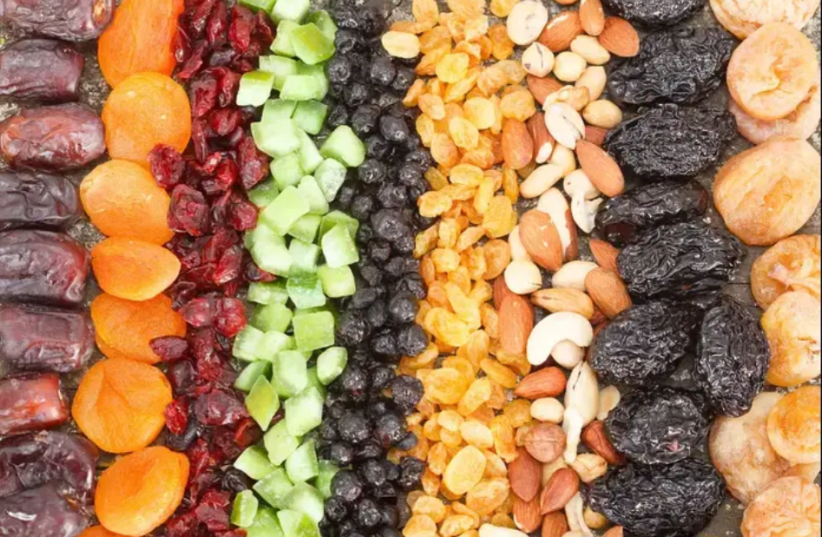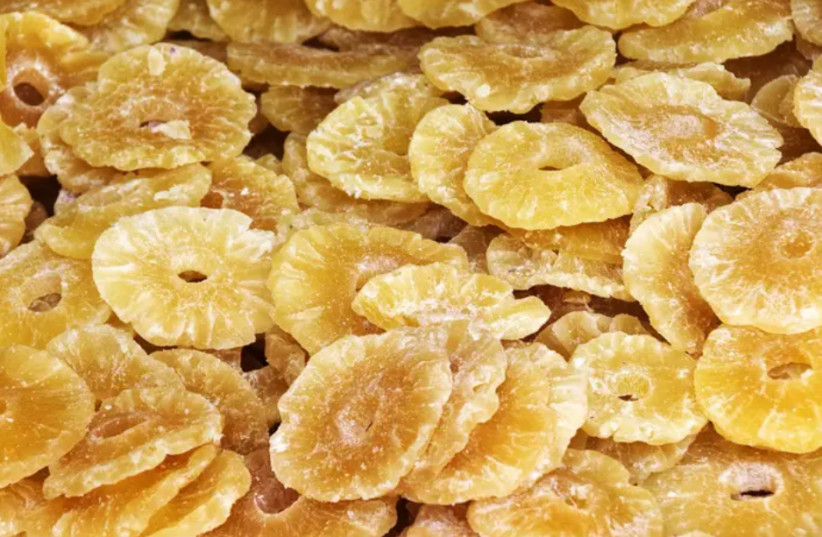The drying process of fruits allows for a longer shelf life while concentrating the fruit's components and preserving most of its nutritional benefits. For example, bananas are rich in magnesium, and after drying, they contain much more magnesium per serving compared to fresh bananas. Additionally, dried fruit can be consumed for several months after being harvested, which is significant, especially for fruits like apricots, which have a very short ripening season of only 5 days.
For thousands of years, the drying process has been done traditionally by spreading the fruits, placing nets over them to prevent damage from pests, and allowing them to dry in the sun. In contrast, the modern process is done in ovens: the fruits are placed in trays and subjected to controlled drying. However, if you buy regular dried fruits, you will also get a variety of chemicals and substances derived from oil.
Here is a detailed list:
1. Sulfates as a Preservative
Dried fruits are very rich in sugars, making them a breeding ground for fungi and molds. In order to prevent infections and extend shelf life, the conventional industry dips the fruits in a strong preservative solution called sulfite. The dipping process inhibits the fruit's browning process and preserves its original color.
It is important to know that there are people who have an allergy to sulfites, and therefore it is forbidden for them to consume dried fruits at all. Many of the dried fruits are sold loose, without packaging or labeling, and therefore can be dangerous for those with allergies. Organic dried fruits, on the other hand, are not allowed to use sulfites, so even when sold loose, they are safe for consumption.
2. Synthetic Color Agents Used
During the drying process, the color of the fruit changes. Conventional dried fruit manufacturers usually add synthetic food coloring to maintain the attractive color of the fruit. Food colorings are allergenic, and children with attention and concentration disorders are sensitive to them. For them, exposure to synthetic food colorings is particularly dangerous as it can worsen hyperactive reactions. Synthetic food colorings are not allowed in organic dried fruits.
3. Petroleum Based Glazing Agent
In the conventional industry, there is the use of sulfiting agents, which are synthetic food additives produced from petroleum ingredients, used to brighten the external surface of the fruit. These substances are prohibited in organic fruits, and the allowed natural brightening agents are waxes such as beeswax or carnauba wax (a natural wax from the carnauba palm tree).
4. Pesticide Residue
It is known that conventional fruits, even if washed and cleaned before the drying process, still contain a certain amount of pesticides. However, the concentration process multiplies those pesticides by up to 5 times. Organic dried fruits are free from any pesticide residue, and therefore remain clean from them even after the concentration process. According to the latest report from the Ministry of Agriculture on pesticide residues in fruits and vegetables, grapes have the highest level of spraying in Israel, so raisins, which are dried grapes and are non-organic, may contain a high level of pesticide residues.
In addition, it should be noted that due to the prohibition of using sulfites for fruit preservation, or synthetic food colorings, organic dried fruits may have a slightly different color or shade compared to regular dried fruits. For example, the organic apricot, which is usually orange, may have a warmer shade.
In conclusion, consuming organic dried fruits ensures no use of substances that may cause health damage and does not contain pesticide residue. It is worth mentioning that the most common dried fruit in the organic market is the organic date, and there are currently around 57 organic date farms in Israel, mainly in the Arava and the Jordan Valley.
Tali Brenner is the Industrial and Food Processing Coordinator at "Tova Ha'Sadeh," the Israeli Organic Agriculture Organization.

